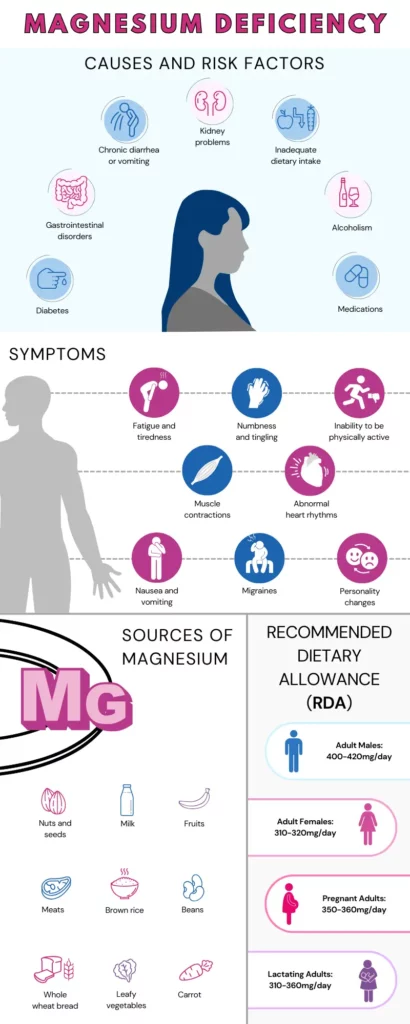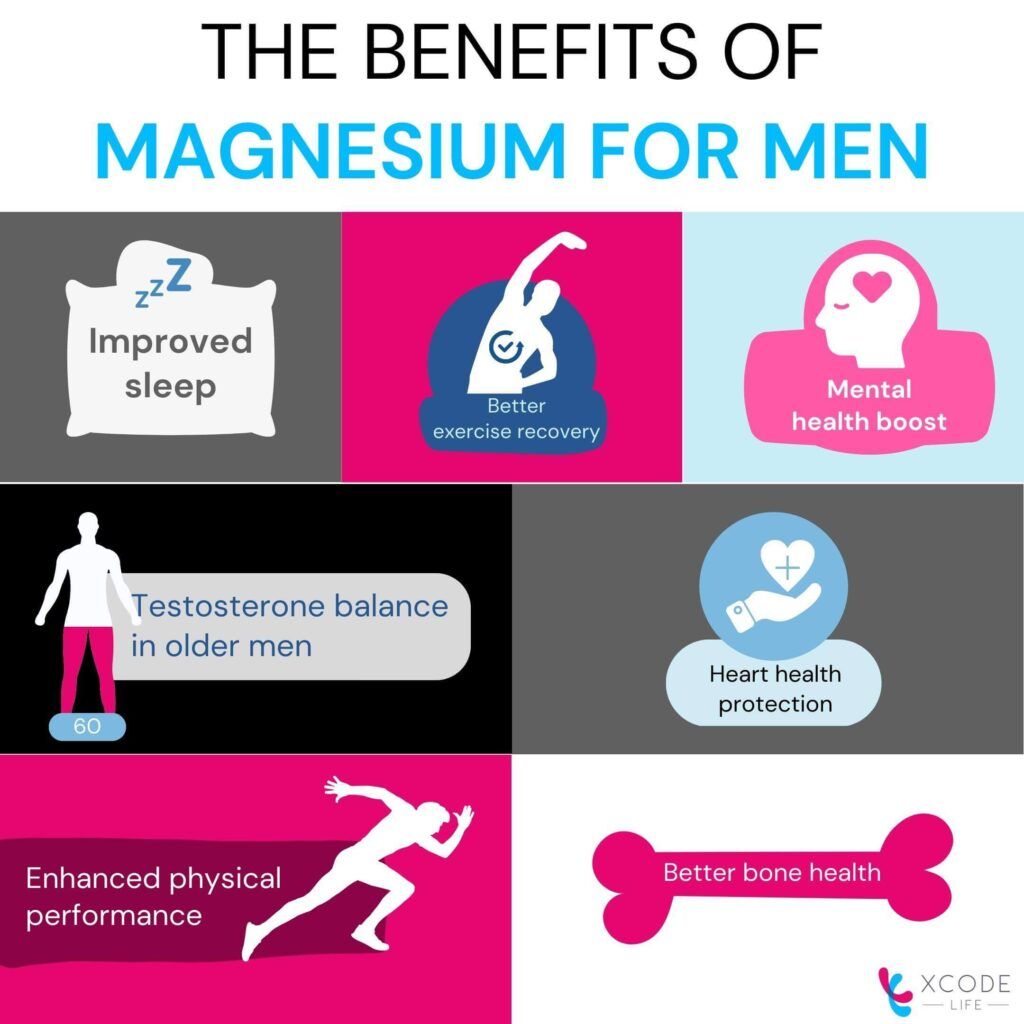Many health experts suggest that magnesium is a prevalent deficiency in the population, but it is also lesser known. However, thanks to the buzz created by TikTok influencers, it's gaining the attention it deserves. While many are aware of magnesium, few know the full extent of its health benefits. This article delves into why magnesium is essential for the body and highlights the top 7 most significant benefits of magnesium for men's health.
Important Functions Of Magnesium In The Body
Magnesium is a vital mineral that plays numerous roles in maintaining overall health. Despite its importance, many people do not consume enough magnesium in their diets. Here are some of the key functions of magnesium in the body:
- Protein synthesis: The mineral aids in the formation of proteins from amino acids, which is essential for the growth, repair, and maintenance of body tissues.
- Energy production: Magnesium is crucial for converting food into energy. It acts as a cofactor in over 300 enzymatic reactions.
- Muscle and nerve function: It helps regulate nerve impulses, ensuring efficient communication between the brain and muscles, which is particularly important for heart function and movement coordination.
- Blood pressure regulation: Studies have shown that higher magnesium intake can lead to reductions in both systolic and diastolic blood pressure, reducing the risk of cardiovascular diseases.
- Blood sugar control: Magnesium enhances insulin sensitivity, which is crucial for preventing type 2 diabetes.
- DNA and RNA synthesis: Magnesium is involved in synthesizing and repairing genetic material, including DNA and RNA.
7 Evidence-based Magnesium Benefits For Men
1. Testosterone Balance
In males with low testosterone levels, magnesium can help bring it to optimum levels.
It plays both a direct role and an indirect role by converting vitamin D to its active form, which is required for testosterone production.
Studies suggest that low testosterone (the primary male sex hormone) in older men may be a predictor of type II diabetes and early mortality.
A 2011 study reports magnesium supplements may help improve testosterone production in older adults and decrease the risk of metabolic conditions like diabetes.
2. Heart Health
Magnesium is key to a healthy heart as it influences neuron signaling and heart muscle contractions.
It also regulates the movement of electrolytes like calcium and potassium into the cells.
A 2013 meta-analysis compared the results of 16 independent studies.
It reports that people with increased circulating magnesium levels had up to a 30% lower risk of developing cardiovascular diseases.
The study further reports that high dietary magnesium levels helped reduce the risk of ischemic heart diseases by up to 22%.
3. Better Sleep
Though the mechanism behind this is unclear, it is hypothesized that magnesium helps with relaxation by acting on certain brain chemicals.
It also may bring down cortisol levels and increase melatonin.
All these can promote better sleep.
A 2012 placebo-controlled clinical trial analyzed the effects of magnesium supplementation on sleep disorders like insomnia and early awakening in older adults.
According to this study, magnesium supplementation helped improve sleep by increasing serotonin and melatonin levels.
4. Physical Performance
Magnesium improves muscle functions and enhances workouts by increasing the glucose availability in the blood.
A 2011 study reports magnesium supplementation can help improve performance strengths in athletes, aiding better handgrip, rotation, and jumping performance.
Working out or physical exercise depletes magnesium levels in the body.
If this is not compensated with dietary or supplementary magnesium, it may affect physical performance.
5. Exercise Recovery
Men who work out regularly always have the risk of post-workout injuries and muscle aches.
Magnesium helps improve muscle flexibility, decreasing the risk of post-workout injuries.
Low magnesium levels in the body may encourage lactic acid buildup in the muscles.
This can lead to muscle aches, burning, and nausea. Improving magnesium hence helps with better exercise recovery.
6. Mental Health
According to Mental Health America, about six million American men are affected by depression yearly.
Depression, bipolar disorder, anxiety, psychosis, schizophrenia, and eating disorders are some of the top mental health issues men face in the country.
Studies report magnesium deficiency can lead to various psychiatric symptoms, including depression.
7. Bone Health
Magnesium affects bone health in men in two ways.
- It reduces bone stiffness and encourages bone reabsorption
- It affects vitamin D and parathyroid hormone levels, both important for bone health.
Are you getting enough Magnesium?
Did you know that certain genes like CASR can increase the risk of magnesium deficiency even when on a nutritionally optimal diet? Get your Gene Nutrition report to understand your nutritional needs.*
*report generated using existing ancestry test DNA data. Xcode does not ship out DNA kits.
Magnesium Deficiency In Men
Magnesium deficiency, also known as hypomagnesemia, occurs when the body does not receive enough magnesium to support its essential functions.
Although rare in healthy individuals, certain conditions can lead to inadequate magnesium levels.
Causes And Risk Factors
- Inadequate dietary intake: A diet lacking in magnesium-rich foods such as leafy greens, nuts, seeds, and whole grains can lead to deficiency.
- Gastrointestinal disorders: Conditions like Crohn's disease or celiac disease can impair nutrient absorption, leading to lower magnesium levels.
- Chronic diarrhea or vomiting: Prolonged gastrointestinal disturbances can result in significant loss of magnesium from the body.
- Kidney problems: Kidney disorders can affect the body’s ability to retain magnesium, causing increased excretion through urine.
- Diabetes: Individuals with diabetes often experience lower magnesium levels due to increased urinary loss and insulin resistance.
- Alcoholism: Excessive alcohol consumption can interfere with magnesium absorption and increase its excretion.
- Medications: Certain medications, such as diuretics and proton pump inhibitors, can contribute to magnesium loss or hinder its absorption.
Symptoms
Magnesium deficiency doesn’t cause significant symptoms immediately. However, chronic magnesium deficiency may lead to the following symptoms.
- Fatigue and tiredness
- Inability to be physically active
- Numbness and tingling
- Muscle contractions
- Nausea and vomiting
- Abnormal heart rhythms
- Migraines
- Personality changes
Men with chronic magnesium deficiency may have a higher risk of developing high blood pressure, type 2 diabetes, and heart diseases.

Magnesium: Consumption Guide
The recommended daily intake of magnesium
| Age | Male | Female | Pregnancy | Lactation |
| Birth to 6 months | 30 mg* | 30 mg* | ||
| 7–12 months | 75 mg* | 75 mg* | ||
| 1–3 years | 80 mg | 80 mg | ||
| 4–8 years | 130 mg | 130 mg | ||
| 9–13 years | 240 mg | 240 mg | ||
| 14–18 years | 410 mg | 360 mg | 400 mg | 360 mg |
| 19–30 years | 400 mg | 310 mg | 350 mg | 310 mg |
| 31–50 years | 420 mg | 320 mg | 360 mg | 320 mg |
| 51+ years | 420 mg | 320 mg |
Source: https://ods.od.nih.gov/factsheets/Magnesium-HealthProfessional/
Sources Of Magnesium
The following are some of the best magnesium-rich foods.
- Nuts and seeds like pumpkin seeds, chia seeds, almonds, cashews, and peanuts
- Spinach and other leafy vegetables
- Soybeans
- Black beans
- Kidney beans
- Brown rice
- Whole wheat bread
- Banana
- Carrot
- Apple
- Milk
- Salmon
- Chicken breast
- Ground beef
Depending on the source, tap water or bottled water can also contain traces of magnesium.
You can also increase your magnesium intake daily by choosing magnesium-fortified foods.
Risks Of Overconsumption
While magnesium is essential for numerous bodily functions, overconsumption can lead to serious health issues.
Understanding the risks associated with excessive magnesium intake is crucial, particularly for those considering supplements.
Effects of Overconsumption
- Abdominal cramps
- Nausea
- Diarrhea
- Lethargy and weakness
- Respiratory distress
Magnesium Supplementation: Things To Keep In Mind
It is always safe to consult a medical practitioner before starting magnesium supplementation.
Depending on your health status and some other factors, your doctor can recommend a suitable form of magnesium.
Some forms of magnesium supplements with better absorption are:
- magnesium citrate
- magnesium lactate
- magnesium aspartate
- magnesium chloride
Interactions with Medications
Magnesium can interact with various medications, including:
- Antibiotics: It may reduce the absorption of certain antibiotics (e.g., tetracyclines and fluoroquinolones) if taken simultaneously.
- Diuretics and heart medications: Some diuretics may lower magnesium levels, while others can increase the risk of toxicity if combined with magnesium supplements
Consultation is key
Discuss any current medications with your healthcare provider before starting magnesium supplements to avoid potential interactions.
Is 500mg Of Magnesium A Day Too Much?
The maximum recommended dosage for males is 420 mg/day and females 350 mg/day.
Anything more than this is considered unsafe and can lead to the side effects mentioned above.
Should I Take Magnesium In The Morning Or At Night?
Magnesium supplements can be taken at any time of the day; what is important here is to be consistent with it.
If you are taking magnesium to resolve sleep issues, then it is better to consume it before going to bed.
FAQs About Magnesium Benefits For Men
Do Men Over 50 Need Magnesium?
Yes, men over 50 do need magnesium. In fact, males aged 30 and above require more magnesium (420 mg/day) than those who are younger than 30 (400 mg/day).
Magnesium can preserve cognition as you age and also supports muscle functions.
Does Magnesium Help With Erectile Dysfunction?
Studies have established a link between low magnesium levels and increased prevalence of erectile dysfunction.
While further research is needed, it is hypothesized that magnesium may assist with erectile dysfunction in several ways:
- Promotes the relaxation of penile blood vessels during erections, enhancing blood flow.
- Boosts testosterone production in males with low magnesium and testosterone levels.
Does Magnesium Raise Testosterone?
Multiple studies have shown that magnesium can help increase testosterone levels in magnesium-deficient males.
The effect is much more on those who engage in regular workouts compared to those with a sedentary lifestyle.
Does Magnesium Increase Blood Flow?
Magnesium is essential for vascular health and can enhance blood flow. It relaxes blood vessels by blocking calcium channels.
It also supports the production of nitric acid, which is required for vasodilation.
Further, magnesium also helps regulate blood pressure, which aids in overall healthy blood flow.
Summary
- Magnesium is a vital macro mineral that helps men stay healthy and active.
- The proper levels of magnesium help protect heart health, reduce the risk of metabolic conditions, improve sleep, increase testosterone levels, and support mental health.
- Magnesium deficiency can cause tiredness and fatigue, muscle contractions, and abnormal heart rhythms, apart from other symptoms.
- Nuts and seeds, leafy greens, bananas, beans, and whole wheat flour are good sources of magnesium.
- Doctor-recommended magnesium supplements help improve levels safely and get the benefits of this mineral.
References
- https://ods.od.nih.gov/factsheets/Magnesium-HealthProfessional/#en2
- https://www.researchgate.net/publication/323444405_Role_of_Magnesium_in_Vitamin_D_Activation_and_Function
- https://www.ncbi.nlm.nih.gov/pmc/articles/PMC5786912/
- https://www.ncbi.nlm.nih.gov/pmc/articles/PMC5622706/
- https://www.mhanational.org/infographic-mental-health-men
- https://pubmed.ncbi.nlm.nih.gov/23950577/https://www.ncbi.nlm.nih.gov/books/NBK500003/
- https://www.medicalnewstoday.com/articles/magnesium-for-sleep





